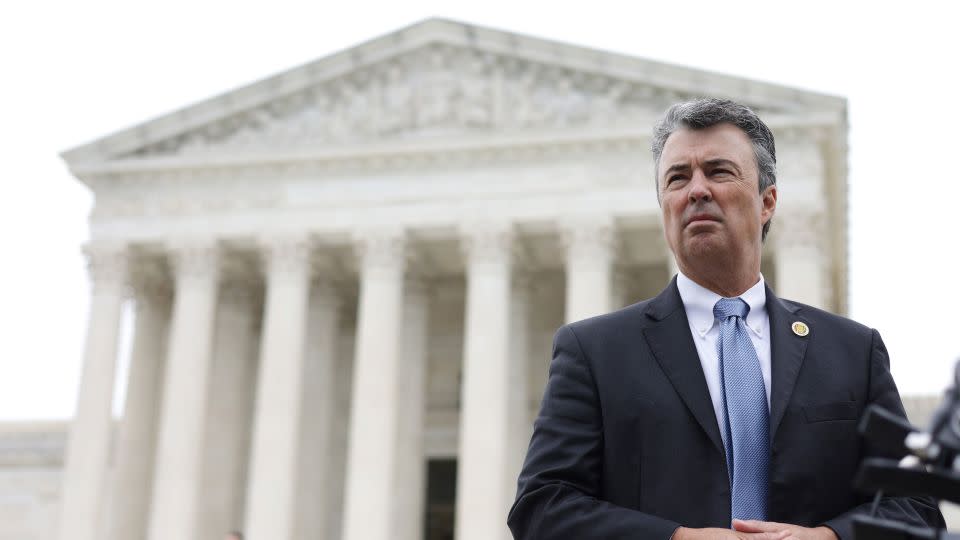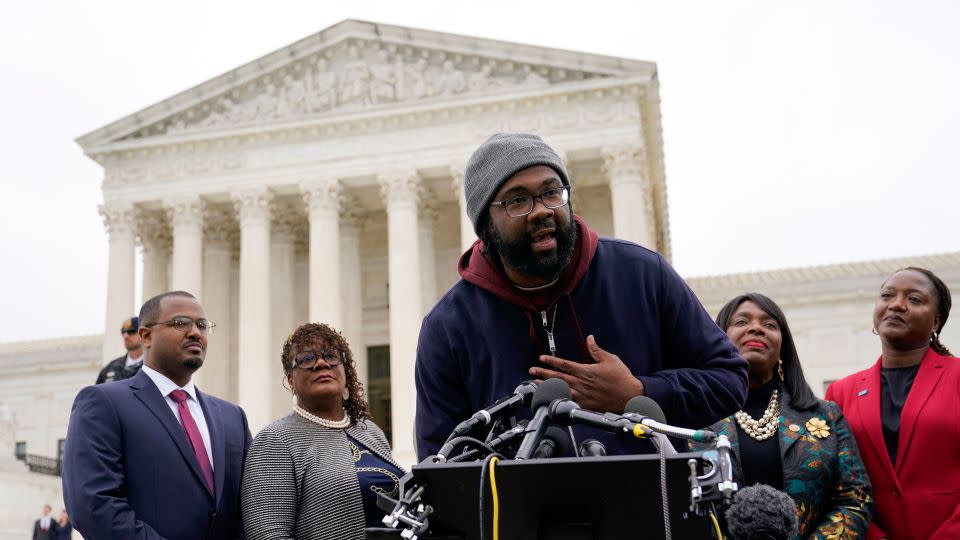SCOTUS tells Alabama it meant what it said the first time
- Oops!Something went wrong.Please try again later.
The Supreme Court delivered a brief but clear message to Alabama on Tuesday: When we said you defied the law, we meant it.
It rejected state officials’ plea for emergency intervention in the Republican-led effort to essentially sidestep a ruling from June and maintain an Alabama redistricting plan that disadvantaged Black voters.
The brief order demonstrated that while the Supreme Court remains open to curtailing the landmark 1965 Voting Rights Act, as it has in the past, the justices themselves want to take the lead. Alabama had pushed too far and too fast.
The justices’ action will have immediate consequences in Alabama and perhaps nationwide in the 2024 elections. The state, which is 27% Black, will now be forced to adopt a map with two Black-majority districts, among the seven congressional seats.
That is likely to mean the state will pick up a new Democratic member of Congress. Black voters lean Democratic in other states with redistricting battles underway, too, and repercussions from the wider redistricting controversy could influence whether Republicans maintain their slim majority in the US House of Representatives.
When the court first ruled, 5-4, against the Alabama map that diluted Black voting power, just three months ago, the justices were emphatic as they ordered a new plan. They said the state’s argument “runs headlong” into past decisions interpreting the protections of the landmark 1965 Voting Rights Act.
But Alabama defied the court majority and refused to draw a new map that would give Black voters a fair opportunity to elect their candidates of choice. State officials, instead, hung their hopes on a separate statement by Justice Brett Kavanaugh, who cast the critical fifth vote in the case of Allen v. Milligan after being torn for weeks in internal negotiations.
In their latest appeal to the high court, state officials cited Kavanaugh 10 times.
Kavanaugh did indeed offer some caveats that could favor states in future litigation, including that “the authority to conduct race-based redistricting cannot extend indefinitely into the future.” But for Alabama in the current situation, Kavanaugh signed onto Chief Justice John Roberts’ strongest defense of the VRA’s Section 2, which prohibits discrimination based on race.
“The heart of these cases is not about the law as it exists,” Roberts wrote in June, joined by Kavanaugh and the three liberal justices. “It is about Alabama’s attempt to remake our Section 2 jurisprudence anew.”
The dispute began in 2021, after the 2020 Census, and as the Republican-controlled Alabama legislature drew just one Black-majority congressional district. A three-judge US district court found that the legislature unlawfully diluted Black voting power by packing much of African American population into one district and dividing the rest among other districts. The judges directed Alabama to draw “two districts in which Black voters either comprise a voting-age majority or something quite close to it.”
After the Supreme Court affirmed that decision in its June ruling in Allen v. Milligan, Alabama legislators drafted a new map. But the revision included a new district with a 40% Black population – less than what would guarantee Black voters an opportunity to elect a candidate of their choice. In that July action, the legislature also lowered the Black population in one longstanding Black-majority district, from about 55% to 51%.
The special three-judge panel again ruled against the state, citing racially polarized voting in Alabama and that the revised map would continue to deprive Black Alabamians of an equal opportunity to elect candidates of their choice.
In an unstinting rebuke to Alabama, the judicial panel said it knew of no other instance “in which a state legislature, faced with a federal court order declaring that its electoral plan unlawfully dilutes minority votes and requiring a plan that provides an additional opportunity district, responded with a plan that the state concedes does not provide that district.”
Alabama, as it appealed again to the high court, justified its revised map by saying that the newly created district consolidated some previously dispersed Black voters and that, more broadly, “states retain broad discretion in drawing districts to comply with the mandate of Section 2.”

Black voters represented by ACLU and NAACP Legal Defense Fund lawyers told the justices the state legislature simply refused to even try to comply with the district court. And they recalled the nation’s “unfortunate history of States resisting civil rights remedies,” most notably in the 1960s.
Alabama’s own history in that regard is distinct. Congress passed the 1965 Voting Rights Act in the wake of the March 7 “Bloody Sunday” violence on the Edmund Pettus Bridge in Selma. State troopers with clubs and bullwhips attacked civil rights protesters.
For years, the Supreme Court had expansively interpreted the protections of the iconic law to try to ensure the franchise for Black and Hispanic people alongside other racial minorities. But it was a case from Alabama, in fact, that significantly marked the Roberts Court’s departure from such precedent.

In 2013, in the Shelby County v. Holder decision, a five-justice majority eviscerated a VRA requirement that states with a history of race discrimination obtain federal approval for any electoral changes. The chief justice wrote at the time that the provision was no longer needed. “Our country has changed,” he said.
Alabama, as the current litigation showed, had not changed – or at least not enough even for today’s conservative-dominated bench.
The justices on Tuesday spurned the request for intervention in a single, terse sentence of denial, with no recorded vote or dissent.
For more CNN news and newsletters create an account at CNN.com

